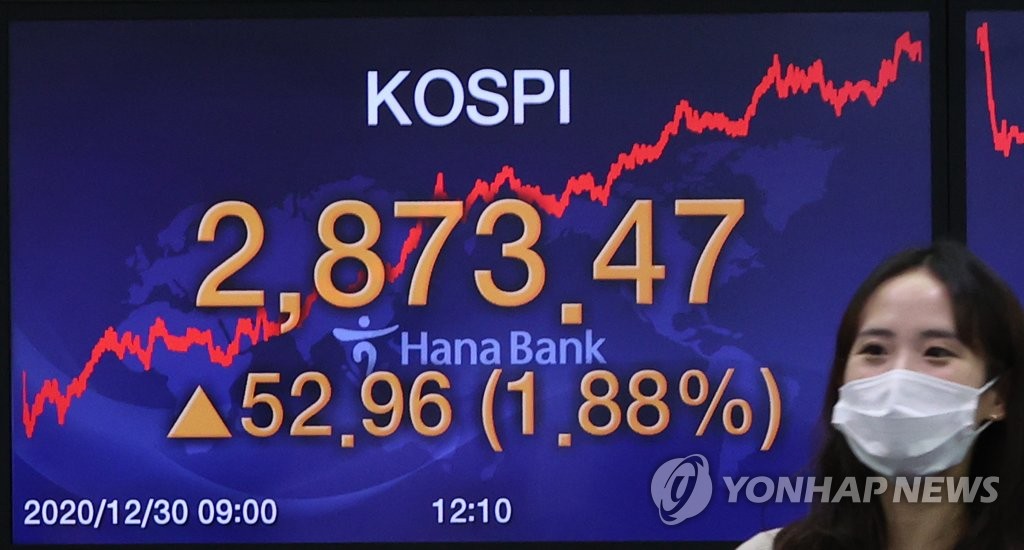104%, the largest ever… Samsung Electronics alone increased by 150 trillion won

On the afternoon of the 30th of last month, the day of the closing of the stock market last year, an employee is passing in front of a billboard in the dealing room at Hana Bank’s main branch in Seoul. On this day, the KOSPI index closed at 2,873.47, up 52.96 points (1.88%) from the previous trading day. [연합뉴스 자료사진]
(Seoul = Yonhap News) Reporter Ji-Heon Lee = The market capitalization of KOSPI listed companies is highly likely to have exceeded Korea’s nominal gross domestic product (GDP) for the first time ever.
According to the Korea Exchange on the 1st, the ratio of the KOSPI market capitalization based on last year’s closing price (December 30) to last year’s nominal gross domestic product (based on GDP and International Monetary Fund projections) rewritten a record high of 104.2%.
This is due to the fact that the KOSPI last year ended the transaction at an all-time high of 2,873.47 thanks to the purchase of individual investors called’Donghak ants’ and the inflow of foreign funds at the end of the year.
The KOSPI market cap exceeded its nominal GDP for the first time on the 11th of last month (1,900 trillion won based on the IMF estimate), and the’year-end rally’ continued, raising the scale to 1980 trillion won on the 30th of last month.
Especially Daejangju Samsung Electronics[005930] The market capitalization increased by more than 150 trillion won over a year, from about 33.1 trillion won to 483 trillion won, which greatly contributed to the increase in market capitalization.
On the other hand, last year’s nominal GDP is expected to decrease from 2019 (1,919 trillion won) in the aftermath of the novel coronavirus infection (Corona 19), further increasing the KOSPI market cap ratio.
In the past, the KOSPI market cap to nominal GDP rose to 94.5% in November 2007, the end of the bull market in the 2000s, but it has never exceeded 100%.
Meanwhile, the total market capitalization of all listed companies, including companies listed on the KOSDAQ market, was 236.6 trillion won, reaching 124.5% of GDP.
The ratio of the total listed stock market capitalization to GDP is also called the’Buffett Index’, and is often used as one of the indicators to determine whether the stock market is overvalued or undervalued compared to the historical average.
Warren Buffett, chairman of Berkshire Hathaway, who is a master of investment, regarded the index as being undervalued if it was less than 80%, and if it was over 100%, it was in the high-value phase.
It is true that there is a controversy over overvaluation of the stock market, but major domestic securities companies are holding the upper end to the low 3,000 line, seeing that there is room for an additional increase this year.
NH Investment & Securities[005940], Samsung Securities[016360], KB Securities, Korea Investment & Securities, and Shinhan Investment & Securities, five major securities firms suggested the expected fluctuation range (band) of next year’s KOSPI 2,260-2,650 below and 2,830-3,300 above.
Unauthorized reproduction-redistribution prohibited>
2021/01/01 07:10 sent
